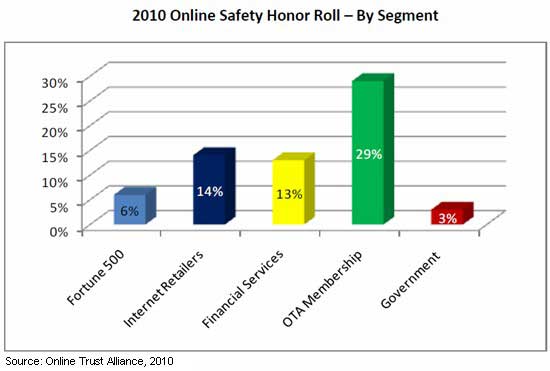Most consumer-facing websites (92%) in the US fail to fully protect their visitors from online fraud, even as growing numbers of businesses continue to deploy online safety measures, according to the Online Trust Alliance (OTA).
Among the 1,200 domains of leading companies analyzed, only 8% earned a spot on the OTA Online Safety 2010 Honor Roll—i.e., they were found to use Extended Validation Secure Socket Layer (EV SSL) Certificates and one or more forms of email authentication technologies, and they successfully scanned for malware.
The 2010 Online Safety Honor Roll comprises the following:
• 14% of Internet Retailer 500 companies (500 largest US e-retailers)
• 13% of the top 100 financial institutions
• 6% of Fortune 500 companies
• 3% of the top consumer-facing government sites
• 29% of the OTA membership

The OTA recognized several "North Stars," organizations that have demonstrated commitment to best practices, industry collaboration, and consumer education. Among them are Apple, Cisco Systems, Microsoft, the Internal Revenue Service, the Social Security Administration, Charles Schwab, Bank of America, eBay, and PayPal.
Below, other findings from the 2010 State of Authentication & the Internet Trust Ecosystem by the OTA.
Email Authentication Standards by Industry Segment
The largest retailers and businesses continue to show the highest level of adoption of email authentication: 76.0% of the Internet Retailer 100 have adopted email authentication standards (up 11% from a year earlier) as have 54.3% of the Internet Retailer 500 (up 5.3%).
Over one-half of Fortune 100 companies (53%) have adopted email authentication standards (up 10.0% from a year earlier) as have 41.2% of Fortune 500 companies (up 4.2%). Some 51.0% of the top financial services companies have adopted email authentication standards, up 12.9% from a year earlier.
Among government agencies, the adoption of email authentication remains stagnant: 32% have adopted email authentication standards, while some 60% of those sites or email servers have been spoofed in the previous four months.
Looking for great digital marketing data? MarketingProfs reviewed more than 200 research sources and selected 64 of the best to create the Digital Marketing Factbook a 144-page compilation of data and 110 charts, covering email marketing, search engine marketing, and social media. Also check out The State of Social Media Marketing, a 240-page original research report from MarketingProfs.
EV SSL Certificates by Industry Segment
Extended Validation SSL Certificates were introduced in 2006 in response to phishing exploits, look-alike websites, and fraudulently obtained SSL Certificates, according to the study. Obtaining EV SSL Certificates requires a more thorough verification and audit process than traditional SSL certificates.
Across industry segments, the adoption of EV SSL Certificates varies:
- Internet Retailer 500: 26.1%
- Top 100 financial services companies: 25.6%
- Fortune 100: 23.1%
- Internet Retailer 100: 18.0%
- Fortune 500: 15.7%
- Top consumer-facing government sites: 11.4%
OTA members lead in embracing best practices: Over 98% have adopted email authentication and nearly 32% have adopted EV SSL Certificates.
View the complete 2010 OTA Honor Roll.
About the data: Findings are based on research conducted by Online Trust Alliance and its members from March 10 to April 4, 2010.



